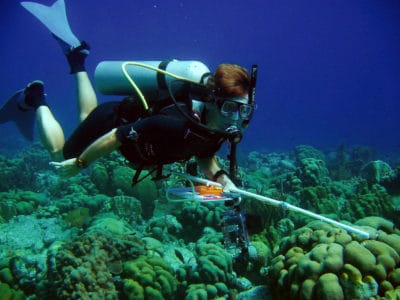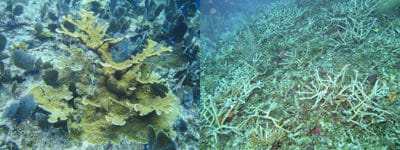
Title: Chief Scientist
Name: Andrew Bruckner
Questions:
What do you do? I am a Coral Reef Ecologist. I am working to identify strategies to halt the degradation of coral reefs and promote their conservation and sustainable use. As Chief Scientist, I am leading the implementation of the Global Reef Expedition. On a day to day basis, I divide my time between field research, planning and execution of research missions, analysis of data, development of reports and products from our findings, and communication with scientists, managers and policy makers and the public on coral reef issues.
How did you get started? I first began to dive in the late 1970’s in Jamaica when reefs were still flourishing. In the early 1980’s, I witnessed the devastation caused by a major hurricane, a rapid die-off of the most important herbivore (long-spined black sea urchins), and an outbreak of a coral disease that targeted elkhorn and staghorn corals.

Over a ten year period, I witnessed mass bleaching events where entire reefs turned stark white, the disappearance of two of the most important and most abundant reef building corals, and the transformation of vibrant coral reefs to meadows of fleshy seaweed. Seeing such remarkable changes over such a short time triggered the future directions of my research. During the 1990’s and 2000’s, I conducted research to better understand the impact of natural factors that were killing corals – coral diseases, outbreaks of coral predators, and hurricanes — before becoming Chief Scientist here at Living Oceans Foundation.

What do you like best about your work? The ability to make a difference. Over my career, I have led initiatives that resulted in the listing of the first two corals on the endangered species list, international regulations in trade in coral reef species through CITES, and implementation of sustainable management practices for coral reef fisheries. I now have the ability to fill major gaps in our understanding of factors and mechanisms that can help enhance the recovery of corals and make them better withstand impacts from climate change. As Chief Scientist with Living Oceans Foundation, I have had an unprecedented opportunity to dive the most remote and untouched coral reefs found on the planet and interact with communities dependent on these resources.
What are your fears about the future of coral reefs? Unless we address direct human impacts on coral reefs, especially pollution from land and unsustainable and destructive fishing practices, reefs will be unable to persist through these periods of climate change. This is becoming increasingly difficult, as human populations are rapidly expanding which increases pressures placed on coral reefs.
What do you hope for the future of ocean conservation? Humans are able to live in balance with the ocean. Future development, agriculture, and other land-based activities will be conducted in an environmentally friendly manner and fisheries will become less destructive and more sustainable.
Dr. Bruckner is the Chief Scientist for Living Oceans Foundation. To learn more about Dr. Bruckner, read some of his publications and view his photos, you may visit his bio page.
One Comment on “Scientist Spotlight – Chief Scientist Andrew Bruckner”
Hannah Konecny
Dear Dr Bruckner,
My name is Hannah Konecny. I’m currently helping to produce a wildlife documentary series entitled ‘Wildest Places’ – 12 x one-hour documentaries on various geographical locations around the world. I’m working with an Australian-based television production company called WildBear Entertainment, which is making this series for Back Catalogue Distribution Limited in Gloucester, a distributor for international broadcast.
The first four episodes look specifically at the ‘Wildest Pacific’, with a view to exploring the Coral Triangle area, its natural history and how that has shaped the marine habitats and marine biodiversity there. One of these four episodes is about bommies and patch reefs and the important role that they play in promoting biodiversity in the Coral Triangle.
I recently found your article here on Living Oceans Foundation about bommies and patch reefs and was wondering if you might be able to answer some more questions that I have about these outcrops, or if you might be able to steer me in the direction of someone who can. I’m hoping to gather a bit more concrete information about how the bommies form, whether or not there are any major differences between patch reefs and bommies and why many fish and shrimp species use bommies as a base to set up their “cleaning stations”.
If you could help me with any of this, I would be very appreciative.
Best wishes,
Hannah